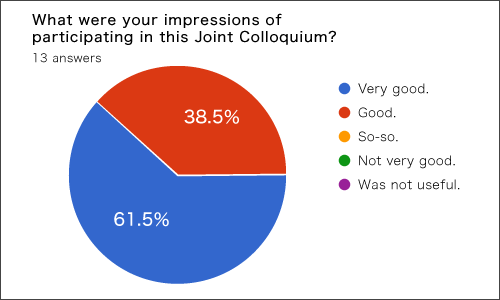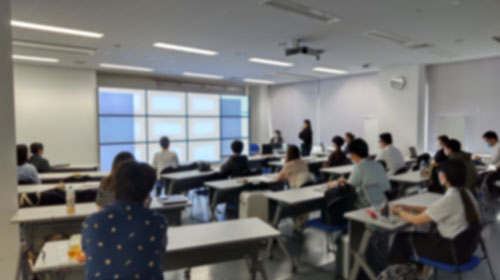Purpose
Graduate education in the humanities and social sciences, especially in cultural sciences, has often focused on fostering researchers who can work intensively on the professional front. Fostering innovative human resources that can flexibly respond to the challenges of today’s turbulent society is not always regarded as an important educational goal. However, people with diverse backgrounds are encountering each other more frequently and globally than ever before. Therefore, the friction and conflict resulting from these mutual exchanges have become increasingly complex. Acquiring new humanistic academic knowledge has become increasingly important to provide guidelines for solving problems and demonstrating leadership while gaining an appreciation of people’s diverse cultural backgrounds and sensitivities and the constant changes we see in social dynamics. From this perspective, humanistic academic knowledge needs to be immediately renewed to build bridges for social implementation and to ensure survival in the modern world. In this program, which is based on the fundamental ideas that underpin the humanities, we will combine the methods of the evolved digital humanities (DH) and put in place a graduate school education program that can provide guidelines for situations that human society has not experienced before.
Guidance for Applied Humanities Program for Cultivating Global Leaders 2021
Characteristics and Excellence
The primary focus of this program is Asian-Eurasian studies. This region has a major influence on Japan’s future course. Asia–Eurasia is an issue-driven region with people of different races, languages, cultures, and religions co-existing. This is a giant testing ground for our ability to deal with the problems that arise in this ever-changing world. Focusing on this region, we are developing a program to understand multilingualism and multiculturalism with an eye toward Russia and the Islamic world, in addition to Southeast Asia, East Asia, and China, where Chiba University has overseas base. Educational and research institutions and companies with whom we will collaborate have accumulated a great deal of experience in distinctive research and practical activities in these regions. By integrating and networking their experiences and knowledge, we can build a world-class center for education and research that can provide multilayered insight into the multilingual and multicultural world of Asia–Eurasia.
The second focus of this program is Digital Humanities 2.0. To predict future trends in this uncertain world, it is essential to make use of the latest techniques, such as social survey statistics and text mining, as well as techniques for interpreting environmental changes and social spaces visualized through geographic information system (GIS) information. Today, educational enlightenment in data science is becoming an increasingly important issue in higher education. We aim to create a practical and applied education program for social statistics, geographical information, and text mining in a multilingual environment to advance humanistic knowledge and Asian-Eurasian studies. Digital Humanities 2.0 will challenge unexplored areas to localize or optimize universal knowledge of data science for social implementation and to grasp the social dynamics of Asia–Eurasia. The critical core of this program is to master, through systematic study, both the micro perspective and techniques (as traditional close reading techniques) that penetrate the maze of cultures and sensitivities, and the macro perspective and techniques (distant reading techniques made possible by Digital Humanities 2.0) that look at key questions from the viewpoint of data science, with data analysis at its core. Based on these foundations, this program will present a new model for human resource development in doctoral courses: the development of top management personnel in graduate schools in the humanities and social sciences.
Sustainability and openness to development: This program will start in cooperation with the following universities and educational research institutions in Japan: Chiba University, Okayama University, Nagasaki University, Kumamoto University, The Graduate University for Advance Studies, Sôkendai, and the National Museum of Japanese History. However, the educational methods tested and the results obtained in this collaboration will not be located solely within the collaborating organization. We will actively share the benefits of these studies with other graduate schools of humanities and sciences nationwide and extend our range of collaboration, aiming to enhance graduate school education in Japan and renew humanistic academic knowledge.
Applied Humanities Program for Cultivating Global Leaders: Focused points and its human resource development
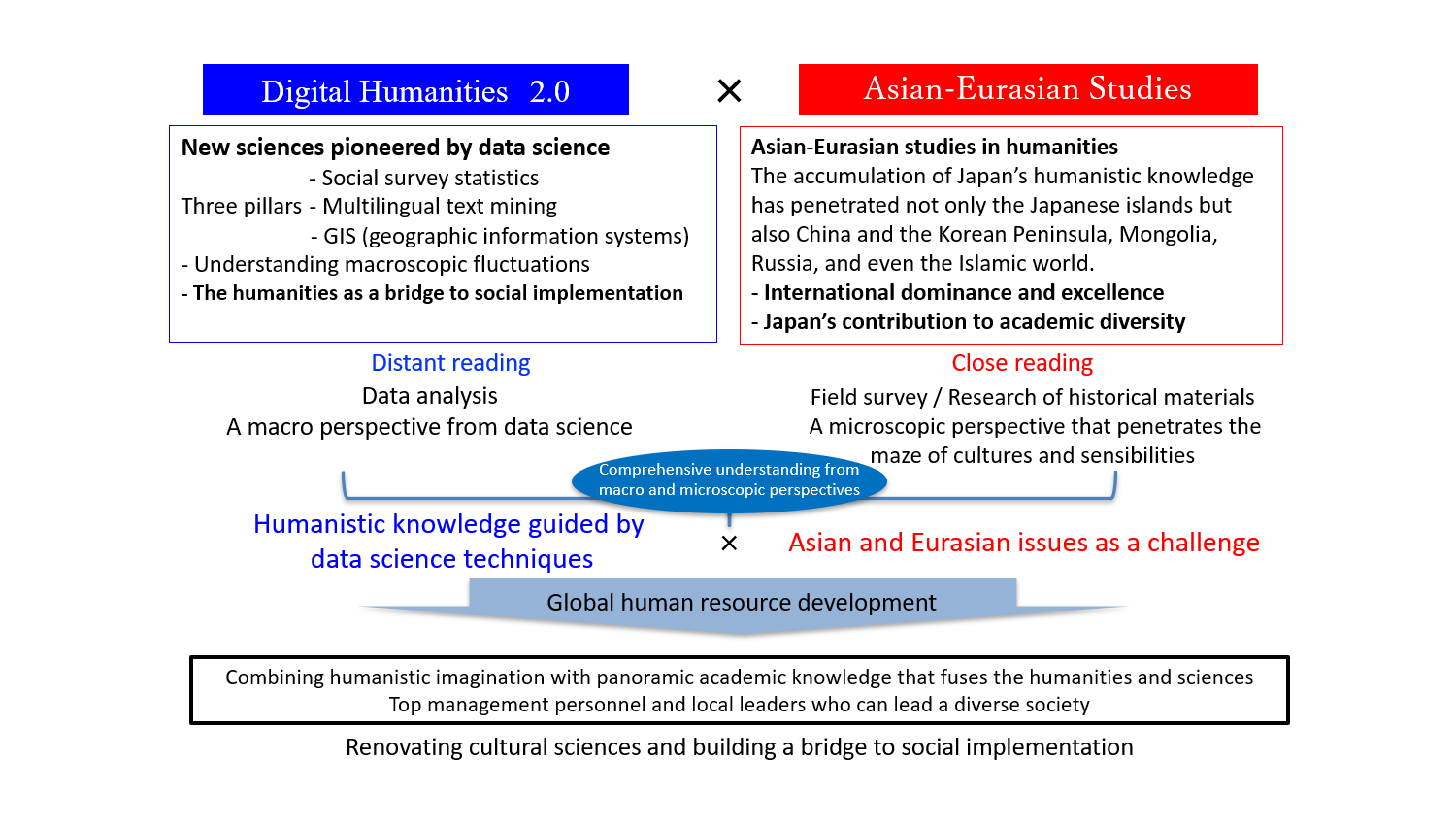
Applied Humanities Program for Cultivating Global Leaders: Network and Excellence for Program Realization
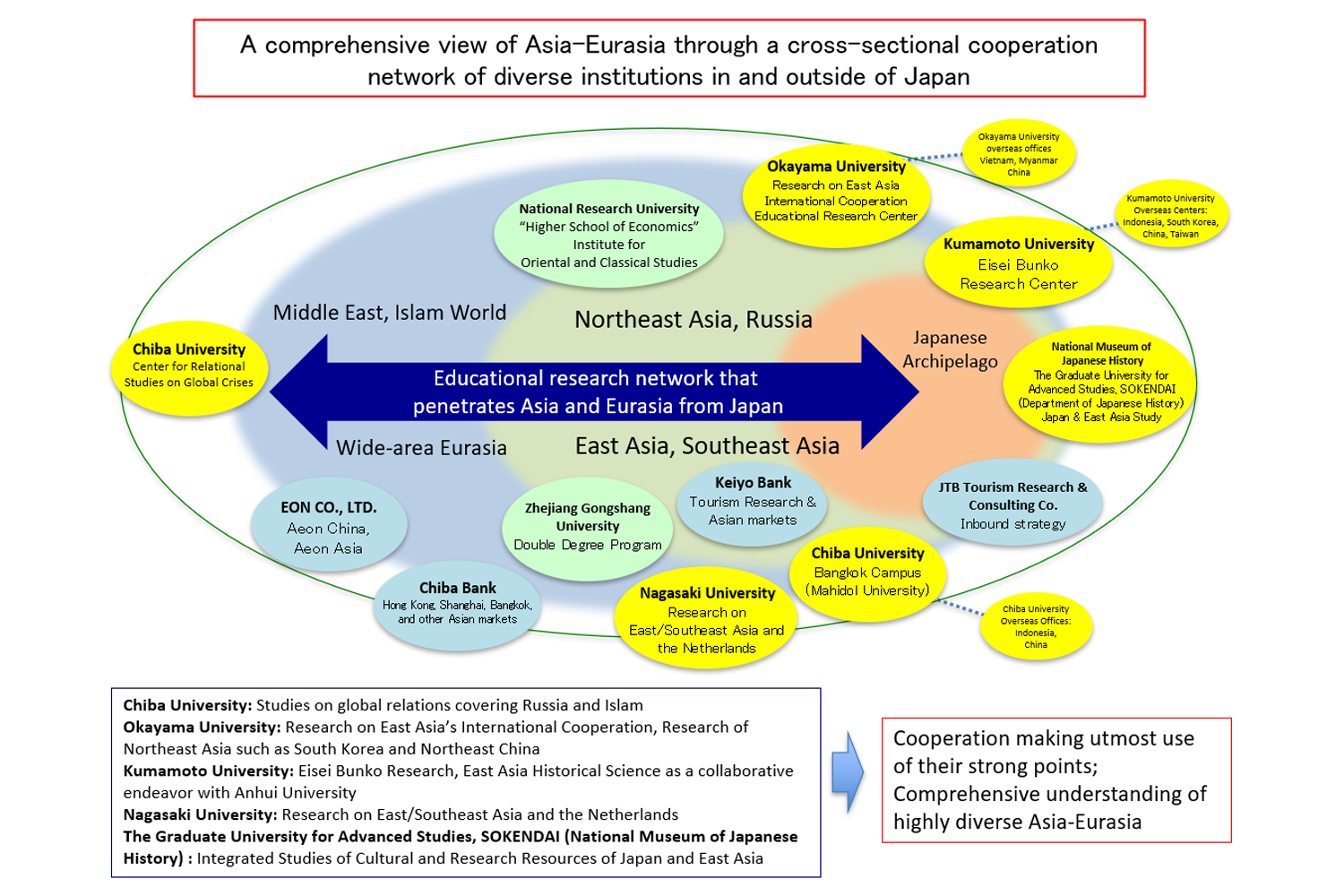
About Lectures, Etc.
Research Methods in Digital Humanities 2.0
This class is taught by Assistant Professor Naoki Kokaze, who is in charge of the Digital Humanities Division of the Applied Humanities Program for Cultivating Global Leaders. Students will learn what form knowledge created through the fusion of digital technology and humanities knowledge should take and will share the benefits and challenges of this new knowledge while aiming to take the first steps into a new and unknown field.
3D Data Conversion of Relics Using 3D Digital Technology
In the Applied Humanities Program for Cultivating Global Leaders, we focus not only on data in textual form, which is mainly handled in DH but also on morphological (three-dimensional) data. We aim to acquire new perspectives that will contribute to the utilization and dissemination of various cultural resources by utilizing the latest 3D-digital technologies, such as 3D scanners, photogrammetry, 3D printers, and VR, and to observe and interpret morphological data from multiple perspectives.
2022 Joint Colloquium
Workshop for Digital Humanities at the National Museum of Japanese History (Rekihaku)
Held on September 7–8, 2022
September 7 (Day 1): Lecture on Digital Humanities
Lecture: DH in Japan and the diversity of its applications
Lecture: Data acquisition from research objects: Metadata and information technology
To provide a comprehensive overview of DH research activities and to learn in practical terms what it means to obtain data from research materials along with information technology.
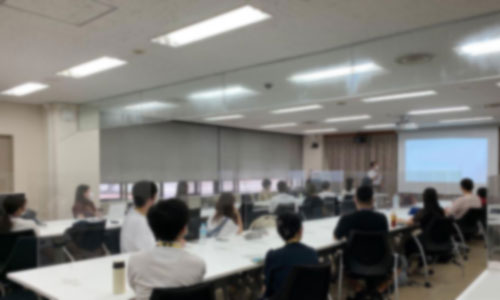
September 8 (Day 2): Workshop for Digital Humanities
A workshop on data acquisition and curation of tangible materials was conducted. Participants were divided into small teams by shuffling their home universities and specialties. Each team decided on a theme, acquired information relevant to the theme from a range of materials held at Rekihaku, and curated them to create a virtual museum. Finally, each team gave a presentation on 1) the theme, 2) the content of their virtual museum, and 3) the merits and challenges of digitizing the materials.
Research report meeting at Chiba University
(September 9, 2022)
At the research report meeting
From the Questionnaire for Joint Colloquium Participants
What I gained from the Joint Colloquium
- It was nice for me to be able to interact face-to-face with various students participating in the WISE Program. I gained fresh academic stimulation from the intensive exchanges through group work with graduate students from different universities with diverse specialties.
Areas That Need to Be Improved
- It would have been nice to have an informal social gathering (I hope the COVID-19 pandemic will soon come to an end).
Other
- Through this opportunity, I realized that I should practice conveying my points more accurately. I have received useful suggestions for my future research activities, including how to communicate my opinions, by witnessing other students' presentations in diverse fields of expertise.
